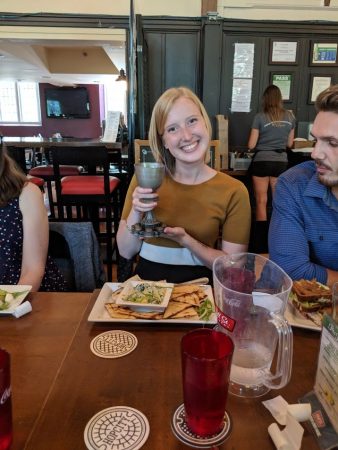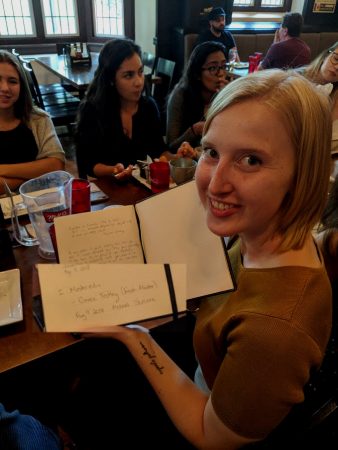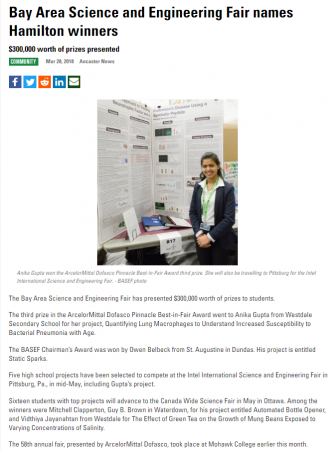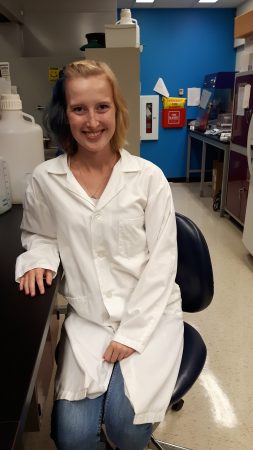The Bowdish lab would like to congratulate our latest MSc, Grace Teskey on a great MSc defence. Congratulations Grace!

Grace drinks from the chalic after defending her MSc.

Grace’s words of wisdom.


The Bowdish lab would like to congratulate our latest MSc, Grace Teskey on a great MSc defence. Congratulations Grace!

Grace drinks from the chalic after defending her MSc.

Grace’s words of wisdom.
Congratulations to Melissa Ling, a former Bowdish lab undergraduate thesis student who was accepted to Yale University’s Masters of Medical Science in the Physician Associate Program. This prestigious program has a 3.6% acceptance rate so we are very proud of her.
Best of luck Melissa!
Pictured here in her Bowdish lab days.

The Bowdish lab is pleased to welcome a recent biochemistry graduate and IIDR summer scholarship winner, Joseph Chon, Mina Sadeghi a MIRA (McMaster Institute for Research on Aging) summer student, Danny Ma a MIRA and NSERC-USRA winner and Melodie Kim, a BHSc summer studentship recipient. We’re thrilled to have such a talented group of students working with us this summer.
The Bowdish lab was very proud to host Anika Gupta, a high school student, for her Bay Area Science and Engineering Fair (BASEF) project.
Her project was entitled “Quantifying Lung Macrophages to Understand Increased Susceptibility to Bacterial Pneumonia with Age.”
Anita won the Dr. Doyle Biology Award for the best Biology project, a Gold merit award as well as the Pinnacle Award for the Third Best in Fair and a sponsored Trip Award to compete in the Intel International Science and Engineering Fair in Pittsburgh, Pennsylvania in May!
Way to go Anika!
See her featured in the Hamilton news here.…
Dr. Bowdish explains what cooties are, how the microbes that live on and in us can be friends and foes and describes how differences in infections and health between boys and girls, men and women are sometimes due to biology and sometimes due to behaviour.
Read the article summarizing the event here.
To see Dr. Bowdish put on a macrophage cape and teach the school kids the difference between a commensal, a pathobiont and a pathogen by dressing up their teachers, watch here…..
Grace aims to determine whether there are subtle changes in the white blood cells of people with neurodevelopmental disorders.
Read the full transcript of her interview for MacART here.
A recent study investigated how dirty children’s bathtoys can be. Dawn and Dr. Lori Burrows commented on this during a number of syndicated CBC radio shows. Read more here…
‘Yucky duckies’ only of concern for the very young, says researcher
On February 3rd 2018, Dawn will be doing the Steeltown Stairclimb to raise money for the Lung Association.
To donate, see her page
http://support.on.lung.ca/site/TR/StepUpampBreathe/StepUpClimbEvent?px=2041173&pg=personal&fr_id=1160
Not only does the Lung Association support research into lung infections and lung health but it advocates for the 1 in 5 Ontarians living with lung disease. One of our major successes this year was passing Bill 71 in provincial parliament which means we now have a Lung Advisory board consisting of patients, caregivers, clinicians and importantly, researchers, to create a Lung Health Action plan and tangible goals to improve lung health in our province. Please consider a donation!
Here’s the CHCH news clip on the event:
https://www.ctvnews.ca/health/how-flu-shots-for-the-young-can-prevent-pneumonia-among-seniors-1.3736385